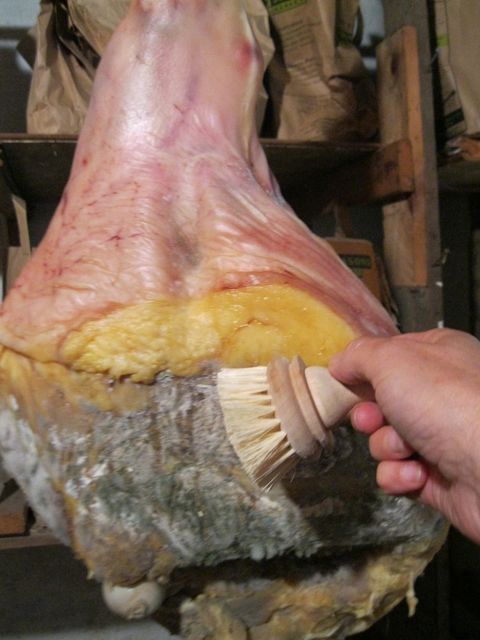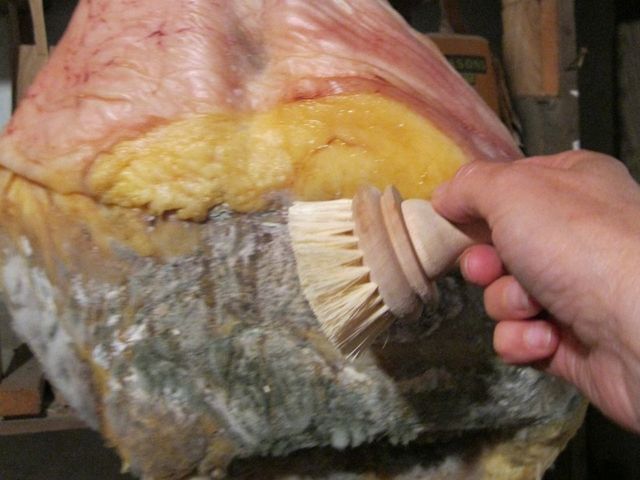
brushing, l
(post, Harriet Fasenfest)
Today I consider two separate but interrelated topics: prosciutto and restaurant work. First, the prosciutto. As you might remember, I’m attempting to make one. It hangs now, some months after [/mix/dinnerguest/porkday2011 "my first post,"] in my friend’s cold basement pantry, covered in mold. My friend, Fred, says not to worry. He instructs me to brush it off (both physically and emotionally). Which I do. I am offering up some images (go to the bottom of this post), but I warn you, neither the before nor after shots look particularly delicious. But the leg smells good, which, at this point, is all I’m hoping for. It is a startling thing, and I will feel so vainglorious if it comes out tasty. So I keep brushing and keep hoping. I will continue to give updates as we go along. Now, on to restaurant work. The other day, as I was chopping parsley, I remembered an important fact: I am, and have long been, a cook. Way before I took on this householding life, I had run restaurants that required I figure out food systems — systems for bringing in product, storing it, prepping it, cooking it, and serving it in infinitely creative and well-crafted ways. So, I wondered, is that why running a householding kitchen appeared so doable to me? Had I long ago developed the chops to do it and thereby discounted the learning curve householding required? Very possibly. But, as I stood there chopping the parsley (which I had gleaned from my neighbor's yard to freeze for future use), I thought about something else: Why do we give so many props to restaurateurs — and so few to homemakers? Certainly the work and skills required in running a householding kitchen can be just as demanding. The question wasn’t so much personal as it was theoretical. Why the disconnect? Somehow in the jobbing-out of our meal production, we have turned the pride of a well-managed home kitchen into something akin to drudgery, or worse. Under the guise of leisure living or the weight of overburdened lives, we have turned over the expert running of our householding kitchens to a simplified and sloppy system of takeout, fast food, and boxed mixes. Over time, we have taken the infinitesimal intricacies and joys of great cooking and turned them over to The Man and his “scientific research” or, in some recent renewal of respect, to the folks with white aprons and heavy debt loads. But having lived on both sides of the counter, so to speak, I know that running a householding kitchen requires the same hard, skilled, commitment-to-detail work as running a successful restaurant. Perhaps even more so, since you are incorporating your gardens and the seasons and the life and needs of the farmers into your design. So why do we get nearly frantic over those farm-to-plate dinners when, in a householding kitchen, you are always serving farm-to-plate meals, if only from your backyard farm to your mom’s chipped china? The way I see it, we householders are mavens of the world’s smallest restaurants. Each day we dice, chop, cook, clean, and repeat for long hours with very little pay — just like the big kids do. We learn our skills patiently and continually, but somehow we are not always that proud. We think it is just “home cooking” or “homemaking,” and give it second-class status when it is so very much more than that. How did that happen? My sense is that industry, advertising, and an obsession with leisure played a big role, but we homemakers jumped right on the bandwagon. We, too, figured we had better things to do with our time and, over time, we lost any memory of what it took to run a great kitchen and home. Today, not only do we have very little pride in the craft, but almost no idea about what it takes to make it all work. Heck, we don’t even have a word for it. Back in my mom’s day, knowing your stuff meant you were a “balaboosta” — a title you wore with pride. Now? Is there even such a word? Sure, I use "householder," but it is_ a bit dry. Could be we need something a tad sexier. Regardless of the title, it is the life that needs revisiting. Not just because I say so, but because those skills — the ability to access great products from great purveyors and use them in a timely and functional way within your kitchen — is what farmers really need. Certainly we can turn that work over to all those farm-to-plate restaurants, but what would it mean to the farmers to have an army of householders who knew how to do exactly that — to buy fresh produce in bulk, in season, every year and day, in a way that would actually support them and the good earth that good farmers treat with care? What would it mean to create an army of householders who could take those items home and, with the least amount of packaging, turn them into every other darn delicious thing you could think of? What would it mean to have the time and inclination to take care of our backyard gardens and put meals — real, simple, seasonal meals — on the table for ourselves and our families, and have those talks everyone says is so vital to have with our children just because we actually had the time to do so? Certainly much good could come from this life. But this life takes work and time. No-joke work, time, and a helluva lot of skills. Which is why I think it is ironic that we give so many props to the restaurants out there and so little to ourselves. That's just gotta change. Though owning restaurants may have given me a head start on this householding life, it did not start there. No, if I go back, way back, I remember hacking up the golf course back in the Bronx to grow some food and baking brownies to sell in the college dining hall. I remember walking through the park with Euell Gibbons' Stalking the Wild Asparagus and making journey cakes from the foraged booty. I remember watching my mother cook and the day I was given the task of chopping the chicken livers, onions, hard-boiled eggs, and parsley for her fragrant and coarse pâté (though we did not call it that). To this day, I remind her that I want that worn-out wooden bowl and chopper, if only that I might pass them on to another. Those are the images that can seduce a girl. Which brings me back to the prosciutto. If there is a leg hanging in my friend’s basement, it is partly because I am obsessed with the politics of this life, but also because I want to be a balaboosta. I want to discover all the things that are involved in good cooking and good kitchen management. I want to support my very good farmer this year, next year, and for years to come, as I buy yet another whole pig and, thereby, put my money where my mouth is (or wants to be). I want to treat every darn beautiful thing that grows in this lovely region with care and to know how to put it up in ways that will take me through the year. [%image moldy float=right width=400 caption="Moldy now; sublime later?"] If I can do it, or imagine it, because I had the skills to begin with, it is only secondary to the instinct that got me here at the start. If I am taking back the pride of this life, it is because I am annoyed, really annoyed, at what industry and modernity has replaced it with. But most importantly, I want to invite you all back home with me, back to this beautiful, hard, slavish life. Hell, those restaurant chefs got nothing on us. Yeah, they get awards and respect and awe from the public, but you want to know something secret? After all is said and done, many of them wish they could be just like us — householding cooks and balaboostas. Home and in their gardens. Believe me, I know. |[%image brushing float=left width=300 caption="Every so often you brush off the mold."]|[%image finished float=right width=300 caption="The leg smells good, which is a good sign."]|

brushing, l

reference-image, l

moldy, l

finished, l